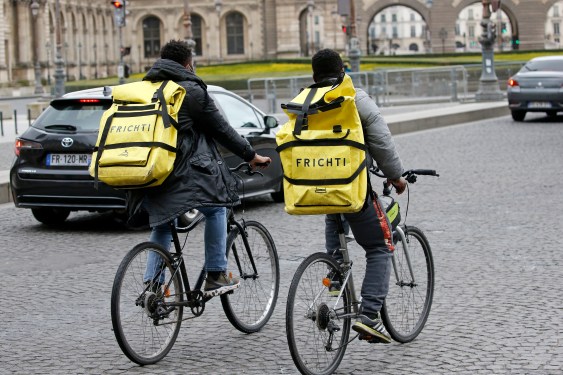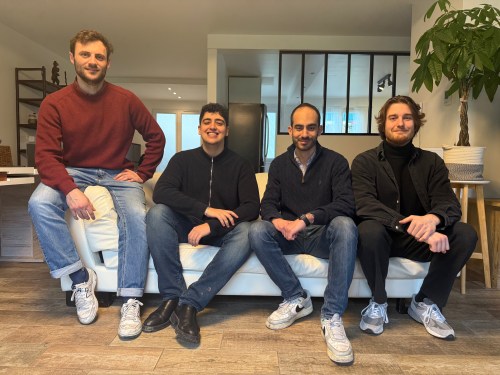
Introduction to Quick Commerce in France and Europe
The rapid evolution of online shopping platforms has revolutionized the way people conduct commerce across Europe. In a world dominated by technology giants like Amazon, Google, and Facebook, smaller startups are increasingly carving out niches for themselves. However, this competitive landscape is becoming more challenging as traditional retailers rethink their strategies to remain relevant in an age where convenience and speed are paramount.
One of the most notable developments in France has been the rise of quick commerce, a term that refers to the rapid growth of companies that offer online shopping experiences akin to physical stores. This phenomenon is not confined to France but extends across Europe, with platforms like ASOS, Cdiscount, and others making waves in the market.
The Background of FRICTI
FRICTI, short for Faisons une servicio de Marché, is a French company that has been operating since 1985. Initially focused on providing high-quality meat products, the company gradually expanded its operations to include a wide range of everyday essentials. By 2010, FRICTI had become one of the most recognized names in quick commerce, with a strong presence both online and offline.
However, despite its success, FRICTI faced several challenges over the years. The company was often accused of prioritizing convenience for convenience’s sake, which led to accusations of exploiting vulnerable consumers. Additionally, FRICTI had made partnerships with major tech companies like Google and Microsoft, which has led some critics to suggest that the company was using these collaborations as a way to reduce its costs.
Gorillas’ Acquisition of FRICTI
In 2019, a group known as Gorillas acquired FRICTI. The acquisition was part of a larger strategy by Gorillas to consolidate its position in the quick commerce sector. According to reports, Gorillas paid an undisclosed sum for FRICTI, and the deal was finalized shortly thereafter.
The acquisition came under scrutiny due to some concerns about data privacy. FRICTI had been collecting user data for several years, and some argue that the company was using this data for targeted advertising on a massive scale without sufficient safeguards in place.
Post-Bankruptcy Plan of Getir
After the acquisition, Gorillas filed for bankruptcy protection earlier this year. This development has left many questions unanswered about the future of FRICTI’s operations. While some believe that the bankruptcy filing is a sign of the company’s downfall, others argue that it may have been inevitable given the challenges faced in the sector.
In response to the bankruptcy, Getir, another French company known for its expertise in online retail and logistics, has stepped in to take over FRICTI’s operations. The acquisition is seen as a crucial step in reviving FRICTI’s fortunes and ensuring that it remains relevant in the competitive quick commerce market.
La Belle Vie: A New Dawn for Quick Commerce
La Belle Vie, a startup with a focus on online grocery shopping, has emerged as a potential disruptor in the quick commerce sector. The company, which gained momentum after the acquisition of FRICTI, is now looking to capitalize on the opportunities presented by the food delivery industry.
La Belle Vie’s strategy is centered around offering a seamless and user-friendly experience for its customers. The company aims to integrate all aspects of online shopping under one roof, from browsing products to placing orders and receiving them right at their doorsteps.
Financials and Growth Strategy
Since its launch, La Belle Vie has been on an upward trajectory, with its revenue growing significantly over the past year. The company’s growth strategy is driven by a focus on innovation and customer satisfaction. With its state-of-the-art logistics network and user-friendly app, La Belle Vie is well-positioned to capture a significant share of the quick commerce market.
However, one major concern has been whether the acquisition of FRICTI will lead to any synergies or cost savings for La Belle Vie. Some experts argue that the two companies could collaborate on areas such as supply chain optimization and data sharing, while others believe that there may be more opportunities than challenges in this regard.
The Impact on Quick Commerce
The merger between La Belle Vie and FRICTI has sparked a lot of interest among tech enthusiasts and industry analysts. While some see it as a major blow to traditional retailers, others argue that the merger is part of a larger trend in the quick commerce sector towards consolidation.
With its focus on convenience and speed, La Belle Vie is well-positioned to challenge established players like ASOS and Cdiscount. However, the company’s ability to maintain its competitive edge will depend on how it manages to integrate FRICTI’s operations into its own ecosystem.
Romain Dillet: A Tech Journaler’s Perspective
Romain Dillet, a tech journalist based in Paris, has been closely following the developments in the quick commerce sector. In his recent article about the merger between La Belle Vie and FRICTI, he provides an insightful analysis of the strategic moves made by these companies.
Dillet argues that the merger is part of a broader shift towards smaller, more nimble companies that are able to adapt quickly to changes in consumer behavior. He believes that La Belle Vie’s focus on innovation and customer satisfaction will give it a significant edge in the competitive quick commerce market.
The Future of Quick Commerce
As the quick commerce sector continues to evolve, one thing is clear: technology plays a crucial role in shaping the future of online shopping. Companies like FRICTI, La Belle Vie, and Getir are leading the charge in this space, demonstrating how innovation and collaboration can drive growth.
However, as more companies enter the market, it will be increasingly challenging to maintain a unique position. The key to success will lie in how companies are able to adapt to changing consumer needs and preferences while maintaining profitability.
Conclusion
The merger between La Belle Vie and FRICTI is a significant development in the quick commerce sector, with far-reaching implications for consumers and businesses alike. While some may view it as a blow to traditional retail, others see it as an opportunity for innovation and growth.
As the market continues to evolve, the ability of companies like La Belle Vie to adapt and innovate will be crucial in determining their success. With its focus on convenience, speed, and customer satisfaction, La Belle Vie is well-positioned to carve out a niche in the competitive quick commerce market.
In conclusion, the merger between La Belle Vie and FRICTI represents a significant moment in the history of quick commerce in France and Europe. While challenges remain, the potential for growth and innovation makes it a story worth following closely.






